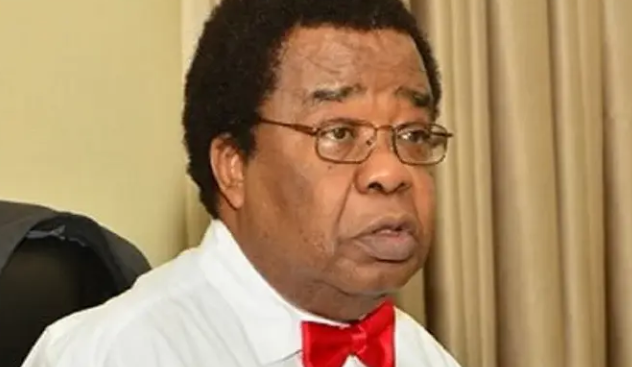Nigeria’s former Minister of Foreign Affairs, Professor Bolaji Akinyemi, has described the Gaza peace deal brokered by U.S. President Donald Trump in Egypt as a hurried and poorly conceptualised initiative driven more by personal ambition than by genuine commitment to peace in the Middle East.
TheNewsGuru.com (TNG) reports Professor Akinyemi to have said President Trump was racing to meet the deadline for the Nobel Peace Prize and and as a result failed to get experts to sit down and really put teeth into the plan that he was aiming for.
Recall that Trump, fresh from a whirlwind visit to Israel on Monday, touched down in Sharm el-Sheikh, Egypt, where he was joined by leaders from Egypt, Qatar, Turkey, and representatives of the United Nations, to sign what is now christened the “Trump Declaration for Enduring Peace and Prosperity”.
However, speaking on Arise News’ The Morning Show on Tuesday, Prof. Akinyemi faulted the design and intent of the deal, which Trump announced on Monday alongside Israeli Prime Minister Benjamin Netanyahu and Egyptian President Abdel Fattah el-Sisi.
The former Foreign Affairs Minister argued that the entire process of the Gaza ceasefire peace deal lacked the depth and technical rigour required to address the long-standing Israeli-Palestinian conflict.
“I think that Trump was racing to meet the deadline for the Nobel Peace Prize,” Akinyemi said. “He was racing to that extent that he did not get experts to sit down and really put teeth into the plan that he was aiming for.”
According to him, what emerged as a “20-stage plan” that appeared elaborate on paper but was fundamentally incoherent.
“Now, we have a 20-stage plan or a 20-stage programme or whatever name you want to put it,” he explained, “but the nexus from one stage to the other is not properly articulated”.
Akinyemi, who served as Nigeria’s Foreign Affairs Minister during the military regime of General Ibrahim Babangida, said Trump’s approach to diplomacy has often been driven by self-promotion and a desire for quick accolades rather than enduring peace-building.
He suggested that Trump’s overriding motivation was to secure the Nobel Peace Prize, an ambition that, he noted, has eluded him despite his persistent lobbying.
“I think that Trump wants peace in the Middle East for his own aims, the Nobel Peace Prize,” Akinyemi stated. “He did not get it this year; everybody is talking about maybe next year.”
The former Minister praised the Nobel Peace Committee for resisting what he described as “bullying tactics” from Trump and some of his allies who sought to pressure the committee into awarding the prize in recognition of the Gaza deal.
“I am so happy that the Nobel Peace Committee did not succumb to the bullying tactics of Trump, Netanyahu, [and] the Prime Minister of Pakistan, in order to arm-twist them into giving this prize to Trump,” Akinyemi said. “This is because they would have reduced the value, the gravitas of the Nobel Peace Prize”.
He noted that the Nobel Peace Prize has historically symbolized integrity and moral authority in global affairs, and any attempt to politicize it for personal or partisan gain would undermine its prestige.
“I am so happy that the committee stood up to the bullying tactic of Trump,” he said. “Next year will be another game show”.
Akinyemi’s remarks add to a growing chorus of skepticism about the viability of the Gaza peace plan, which Trump had hailed as a “historic breakthrough” during its unveiling in Cairo.
Critics across the Arab world and within the international diplomatic community argue that the deal fails to address core issues such as Palestinian sovereignty, the status of Jerusalem, and the right of return for displaced persons.
Many observers also note that Trump’s deal was crafted without broad-based consultation among regional stakeholders, including the Palestinian Authority and key Arab nations such as Jordan and Lebanon, an omission that could render the plan unworkable in the long term.
Diplomatic analysts say Akinyemi’s criticism reflects the sentiment of many African and global foreign policy experts who view Trump’s transactional approach to diplomacy as incompatible with the complex realities of the Middle East.
By rushing to secure a high-profile peace deal before the Nobel nomination deadline, they argue, Trump may have sacrificed the painstaking groundwork essential to genuine conflict resolution.
For Akinyemi, whose distinguished career in international relations has included years of teaching, research, and diplomatic service, the lessons are clear: sustainable peace cannot be achieved through spectacle or personal ambition.
“Peace processes,” he has often said in earlier interviews, “require patience, empathy, and trust-building, not public relations exercises”.
As the world watches to see whether the Gaza peace plan will hold, Akinyemi’s warning serves as a reminder that true diplomacy is not a race for prizes, but a commitment to justice, balance, and enduring stability.



























